I Get Lost Thinking About The Journey Crowley Makes From Eden To The Apocalypse. I Completely Adore Pre-Flood

I get lost thinking about the journey Crowley makes from Eden to the Apocalypse. I completely adore pre-Flood Crawly, the way that he’s still gleeful and curious about the world. He’s such a wily mischief fluff.
In praise of terrific and deliberate costume design: I can’t believe it took me this long to notice the way he gradually covers up his eyes more and more. After the Flood, she has her head covered. The next time we see him, post-Crucifixion, the sunglasses have arrived. And the specs get progressively larger over time, hiding more and more.


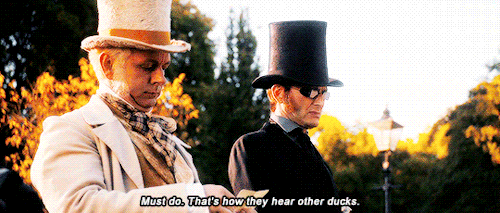
(I particularly love the L-shaped lenses in 1862.)
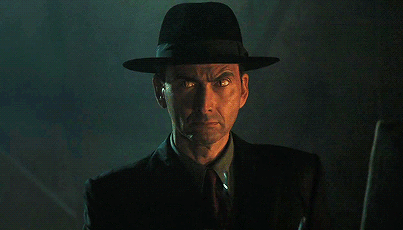
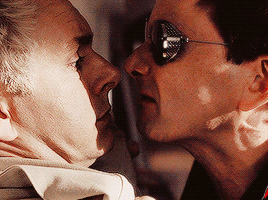
By the time we reach the Apocalypse, the glasses are opaque and completely closed off. Solid, armored protection on all sides.
(I know I didn’t catch every era, don’t @ me, tumblr gif search is the worst and the general progression seems fairly obvious, especially because of where it ends.)
You can see the progression on Crowley’s face too, of course. Watching Humans being Humans for so long starts to get to a demon. The glasses have to be impenetrable when this is where time and the Ineffable Plan have brought you.
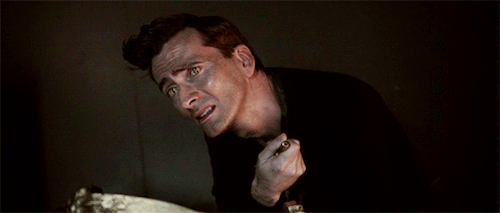
(Got to be careful who gets to see you with the glasses off.)
(Got to have a whole glove box filled with extras so as never to be caught without them.)
There is something carefree about Crowley’s very first park bench scene with Aziraphale, in ep1. But it’s such a different kind of carefree than we used to see before the Flood. It’s world-weary, resigned, cool. He’s seen it all and he knows how the game is played.
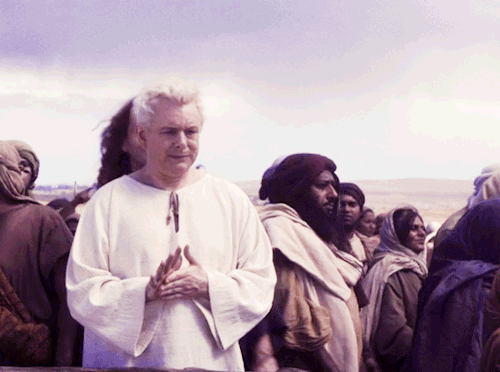
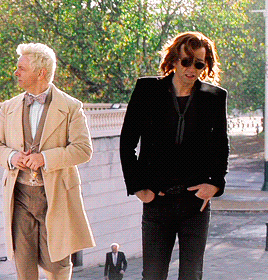
This contrast, to me, is so perfect: he’s still Crowley. He’s just been around the block a few times by now.
And even after all of this, he wants to save the world.
More Posts from Sohmygodness and Others
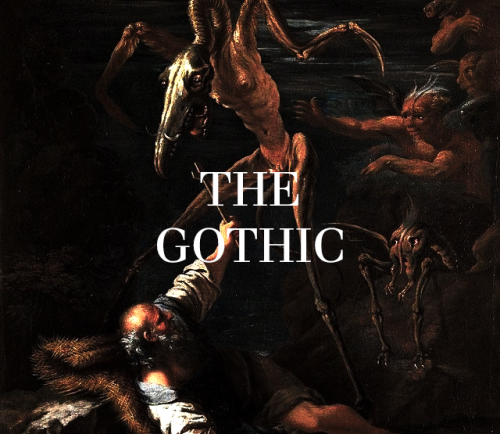
Masterpost of Free Gothic Literature & Theory
Classics Vathek by William Beckford Wuthering Heights by Emily Brontë The Woman in White & The Moonstone by Wilkie Collins Carmilla by Joseph Sheridan Le Fanu The Turn of the Screw by Henry James The Monk by Matthew Lewis The Phantom of the Opera by Gaston Leroux Melmoth the Wanderer by Charles Maturin The Vampyre; a Tale by John Polidori Collected Works of Edgar Allan Poe Confessions of an English Opium-Eater by Thomas De Quincey The Mysteries of Udolpho by Ann Radcliffe The Strange Case of Dr. Jekyll and Mr. Hyde by Robert Louis Stevenson Dracula by Bram Stoker The Castle of Otranto by Horace Walpole The Picture of Dorian Gray by Oscar Wilde Frankenstein; Or, The Modern Prometheus by Mary Wollstonecraft Shelley
Short Stories and Poems An Occurrence at Owl Creek Bridge by Ambrose Bierce Songs of Innocence & Songs of Experience by William Blake The Rime of the Ancient Mariner by Samuel Taylor Coleridge The King in Yellow by Robert W. Chambers The Legend of Sleepy Hollow by Washington Irving The Yellow Wallpaper by Charlotte Perkins Gilman
Pre-Gothic Beowulf The Divine Comedy by Dante Alighieri A Journal of the Plague Year by Daniel Defoe Faust by Johann Wolfgang von Goethe The Tragical History of Doctor Faustus by Christopher Marlowe Paradise Lost by John Milton Macbeth by William Shakespeare Oedipus, King of Thebes by Sophocles The Duchess of Malfi by John Webster
Gothic-Adjacent Northanger Abbey by Jane Austen The Wendigo by Algernon Blackwood Jane Eyre & Villette by Charlotte Brontë Lyrical Ballads, With a Few Other Poems by Coleridge and Wordsworth The Mystery of Edwin Drood by Charles Dickens The Idiot & Demons (The Possessed) by Fyodor Dostoyevsky The Man in the Iron Mask by Alexandre Dumas Moby-Dick by Herman Melville The Island of Doctor Moreau by H. G. Wells
Historical Theory and Background The French Revolution of 1789 by John S. C. Abbott Shakespearean Tragedy: Lectures on Hamlet, Othello, King Lear, Macbeth by A. C. Bradley The Tale of Terror: A Study of the Gothic Romance by Edith Birkhead On Heroes, Hero-Worship, and the Heroic in History by Thomas Carlyle Demonology and Devil-Lore by Moncure Daniel Conway Ancient Pagan and Modern Christian Symbolism by Inman and Newton On Liberty by John Stuart Mill The Social Contract & Discourses by Jean-Jacques Rousseau Feminism in Greek Literature from Homer to Aristotle by Frederick Wright
Academic Theory Introduction: Replicating Bodies in Nineteenth-Century Science and Culture by Will Abberley Viewpoint: Transatlantic Scholarship on Victorian Literature and Culture by Isobel Armstrong Theories of Space and the Nineteenth-Century Novel by Isobel Armstrong The Higher Spaces of the Late Nineteenth-Century Novel by Mark Blacklock The Shipwrecked salvation, metaphor of penance in the Catalan gothic by Marta Nuet Blanch Marching towards Destruction: the Crowd in Urban Gothic by Christophe Chambost Women, Power and Conflict: The Gothic heroine and “Chocolate-box Gothic” by Avril Horner Psychos’ Haunting Memories: A(n) (Un)common Literary Heritage by Maria Antónia Lima ‘Thrilled with Chilly Horror’: A Formulaic Pattern in Gothic Fiction by Aguirre Manuel The terms “Gothic” and “Neogothic” in the context of Literary History by O. V. Razumovskaja The Female Vampires and the Uncanny Childhood by Gabriele Scalessa Curating Gothic Nightmares by Heather Tilley Elizabeth Bowen, Modernism, and the Spectre of Anglo-Ireland by James F. Wurtz Hesitation, Projection and Desire: The Fictionalizing ‘as if…’ in Dostoevskii’s Early Works by Sarah J. Young Intermediality and polymorphism of narratives in the Gothic tradition by Ihina Zoia
torn (apart and between)

✦ this was inspired by Gustav Klimt’s “The Kiss“ painting.


by roksolyana_hilevych
these guys look like theyre fighting over how to make a soup

"hey can i put this in"
"NO ARE YOU FUCKING KIDDING ME IT'LL RUIN IT"
One of my favourite bits of media history trivia is that back in the Elizabethan period, people used to publish unauthorised copies of plays by sending someone who was good with shorthand to discretely write down all of the play's dialogue while they watched it, then reconstructing the play by combining those notes with audience interviews to recover the stage directions; in some cases, these unauthorised copies are the only record of a given play that survives to the present day. It's one of my favourites for two reasons:
It demonstrates that piracy has always lay at the heart of media preservation; and
Imagine being the 1603 equivalent of the guy with the cell phone camera in the movie theatre, furtively scribbling down notes in a little book and hoping Shakespeare himself doesn't catch you.
I wish that ao3 had an option to filter warnings (and tbh certain authors) out like I will never ever want to read it and just seeing it puts me off so much that often I end up closing my browser because that content upsets me so much lmao
i need a stronger word than friend. not best friend no because. no. no no. you just don’t get it.
sure, this is my best friend, this is my closest friend.… but. it just feels like an understatement.
they’re not a partner or a significant other, no, it’s not like that… but we’re built for each other. soulmates. twin flames. the half of me i’ve been missing.
so like… where… is the word for that. i cannot keep saying ‘my friend’ whenever i am talking about them on here i’m going insane
Good Omens Script Book Deleted Scenes
I have just spent the last 3-4 hours scouring the internet for the 5 deleted scenes that were spread between limited edition copies of the Good Omens script book so I could print them and put them into my signed, 1st edition, copy of the script book.
Through much trial and piecing together pictures of the pages from Google Images, I managed to find and type up all of the scenes. I figured that since I couldn’t find a place with all the deleted scenes in one I may as well share what I wasted 4 hours of my life on for others who care to read the deleted scenes in one place. The only scene I didn’t type up was the 4 Horsemen scene since it’s included in every book. Considering Gaiman himself had assumed that all copies of the book would have all the scenes I don’t feel too bad doing this.
You can read the scenes here:
https://docs.google.com/document/d/1diJukGVVYlWJSnJ_Mq5dKjtC2DjHNU5ND8n3gR3-BRQ/edit?usp=sharing
If the link doesn’t work, please let me know.
Also, if you find any typos that I missed that doesn’t seem like a Gaiman-esque purposeful typo let me know.
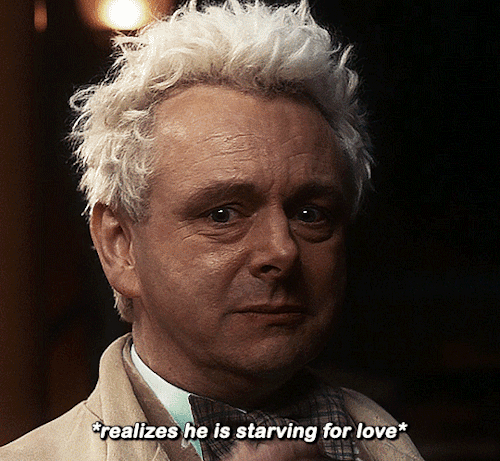

#Aziraphale didn’t know he was starving for Crowley’s love until he tasted him.

that wilfred owen poem about everyone kissing the crucifix but he kisses the hands of the boy whos holding it hits HARD not sure why but damn
-
 cryptidcatsstuff liked this · 5 months ago
cryptidcatsstuff liked this · 5 months ago -
 biscuits-and-feathers reblogged this · 7 months ago
biscuits-and-feathers reblogged this · 7 months ago -
 x-lee-cya reblogged this · 11 months ago
x-lee-cya reblogged this · 11 months ago -
 x-lee-cya liked this · 11 months ago
x-lee-cya liked this · 11 months ago -
 introverted-astrophile liked this · 1 year ago
introverted-astrophile liked this · 1 year ago -
 nice-little-omens liked this · 1 year ago
nice-little-omens liked this · 1 year ago -
 freshnotfunky liked this · 1 year ago
freshnotfunky liked this · 1 year ago -
 craftystrangerhideout liked this · 1 year ago
craftystrangerhideout liked this · 1 year ago -
 brunette-weasel liked this · 1 year ago
brunette-weasel liked this · 1 year ago -
 g-l-o-w-y-l-i-g-h-t-s reblogged this · 1 year ago
g-l-o-w-y-l-i-g-h-t-s reblogged this · 1 year ago -
 beledibabe liked this · 1 year ago
beledibabe liked this · 1 year ago -
 unforgivablengk reblogged this · 1 year ago
unforgivablengk reblogged this · 1 year ago -
 mr-tom-a-dildo-lover liked this · 1 year ago
mr-tom-a-dildo-lover liked this · 1 year ago -
 megan03 liked this · 1 year ago
megan03 liked this · 1 year ago -
 azirawitch reblogged this · 1 year ago
azirawitch reblogged this · 1 year ago -
 azirawitch liked this · 1 year ago
azirawitch liked this · 1 year ago -
 andyeshallbetherealsoanathema liked this · 1 year ago
andyeshallbetherealsoanathema liked this · 1 year ago -
 andyeshallbetherealsoanathema reblogged this · 1 year ago
andyeshallbetherealsoanathema reblogged this · 1 year ago -
 sublondon liked this · 1 year ago
sublondon liked this · 1 year ago -
 seileach67 liked this · 1 year ago
seileach67 liked this · 1 year ago -
 catsteinbooks liked this · 1 year ago
catsteinbooks liked this · 1 year ago -
 spooky-magic-lapin liked this · 1 year ago
spooky-magic-lapin liked this · 1 year ago -
 booknerd-1313 liked this · 1 year ago
booknerd-1313 liked this · 1 year ago -
 errantemilia liked this · 1 year ago
errantemilia liked this · 1 year ago -
 piratefoxyqueen liked this · 1 year ago
piratefoxyqueen liked this · 1 year ago -
 maximumpenguinpuppy liked this · 1 year ago
maximumpenguinpuppy liked this · 1 year ago -
 cobragardens reblogged this · 1 year ago
cobragardens reblogged this · 1 year ago -
 autistic-velociraptor liked this · 1 year ago
autistic-velociraptor liked this · 1 year ago -
 mokocharm liked this · 1 year ago
mokocharm liked this · 1 year ago -
 thecircularpi liked this · 1 year ago
thecircularpi liked this · 1 year ago -
 zeldahime reblogged this · 1 year ago
zeldahime reblogged this · 1 year ago -
 quoththemaiden reblogged this · 1 year ago
quoththemaiden reblogged this · 1 year ago -
 comefromtheforest reblogged this · 1 year ago
comefromtheforest reblogged this · 1 year ago -
 comefromtheforest liked this · 1 year ago
comefromtheforest liked this · 1 year ago -
 also-wolfxe liked this · 1 year ago
also-wolfxe liked this · 1 year ago -
 ninthehero reblogged this · 1 year ago
ninthehero reblogged this · 1 year ago -
 under--the--radar reblogged this · 1 year ago
under--the--radar reblogged this · 1 year ago -
 shades-of-loathesome-beige reblogged this · 1 year ago
shades-of-loathesome-beige reblogged this · 1 year ago -
 disasterspocklet liked this · 1 year ago
disasterspocklet liked this · 1 year ago -
 ninthehero liked this · 1 year ago
ninthehero liked this · 1 year ago -
 hehe-wangxian liked this · 1 year ago
hehe-wangxian liked this · 1 year ago -
 vaguely-in-vogue liked this · 1 year ago
vaguely-in-vogue liked this · 1 year ago -
 sobbingeternally liked this · 1 year ago
sobbingeternally liked this · 1 year ago -
 cerezasticks liked this · 1 year ago
cerezasticks liked this · 1 year ago -
 kaeoss-theerie liked this · 1 year ago
kaeoss-theerie liked this · 1 year ago -
 fandomfaeofveryfewf4cks liked this · 1 year ago
fandomfaeofveryfewf4cks liked this · 1 year ago -
 mybelovedismine liked this · 1 year ago
mybelovedismine liked this · 1 year ago -
 orangestapler liked this · 1 year ago
orangestapler liked this · 1 year ago